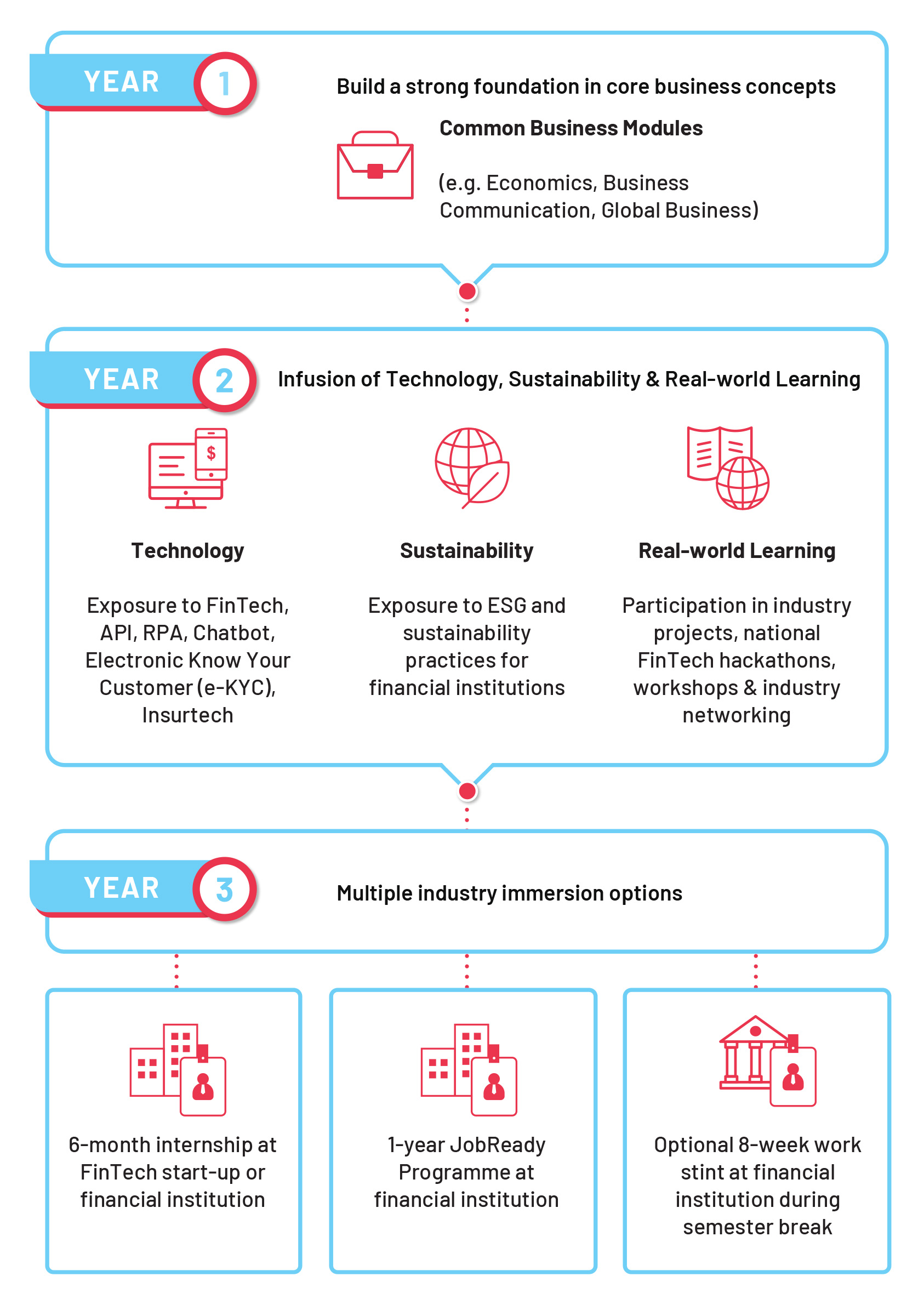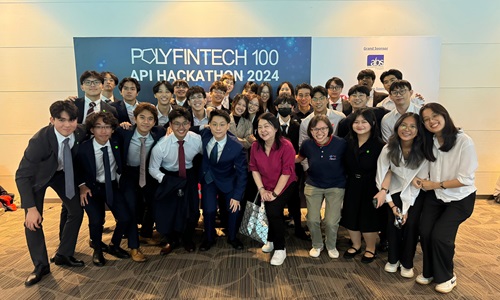Why BF?
- Gain a head start in the financial and FinTech ecosystems with a broad-based curriculum that equips you with essential digital skills
- Leverage technology and sustainability knowledge to address key challenges in green finance
- Go on a six-month internship in FinTech start-ups and financial institutions, or the one-year JobReady Programme for in-depth, real-world learning
- Develop industry-relevant skills through project-based assessments
About BF
Technology, innovation, and the pursuit of sustainability are transforming the financial world. With our Diploma in Banking & Finance (BF), you will gain these skills and more to shape the future of banking!
The BF course gives you a solid foundation in accounting and business, along with specialised training in banking and finance. You will discover how banks operate and explore key topics such as environmental, social and governance (ESG) standards and green finance. This knowledge will prepare you to make a real impact in driving sustainable finance initiatives.
As the Sector Coordinator of Singapore’s Accountancy & Financial Services cluster, BA has built strong industry connections to provide you with meaningful learning experiences, as well as networking and mentorship opportunities.
You will participate in events including the Pan-Poly FinTech Hackathon and other national competitions such as the CGSI ASEAN Investment Challenge. Additionally, you will work on industry projects that allow you to apply your skills to real-life business scenarios. To ensure your training is aligned to industry needs, you will learn from industry professionals through their feedback and co-assessment.
In your final year, embark on enriching internships with prestigious local and foreign banks, as well as FinTech start-ups.
For deeper work exposure, you can choose from the one-year JobReady Programme, a six-month internship, or an optional 8-week work stint during your semester break. With leading partners such as DBS, OCBC, UOB, the Monetary Authority of Singapore, Singapore Exchange Limited, GIC, HSBC, Julius Baer, and SeaMoney, your internship experience will be a fulfilling one.

Overview of Your BF Journey

Highlights
Close to 100 BF students participated in the annual PolyFinTech 100 API Hackathon 2024, a competition meant to nurture FinTech talents. A group of BF students clinched the winning title in the Decentralised Finance and RegTech categories for their innovative ideas.
Further Studies
The BF diploma is recognised by all local and many overseas universities. In Australia and the United Kingdom, you may receive up to a one-year exemption, allowing you to complete your degree earlier. Professional bodies like the Institute of Chartered Accountants in England and Wales (ICAEW) and the Institute of Banking & Finance (IBF) also recognise our diploma.
Additionally, you will be exempted from one module of the Capital Markets & Financial Advisory Services (CMFAS) examinations. In partnership with the Financial Planning Association of Singapore (FPAS), all BF students graduate with the Associate Financial Planner (AFPCM) certification, giving you a head start on the path to becoming a Certified Financial Planner (CFP®).
Careers
As a BF graduate, you will have strong career opportunities in fields such as FinTech, corporate finance, financial planning, investment and wealth management, ESG, sustainable finance, KYC, risk management, compliance, operations management, credit as well as digital marketing. You can pursue roles such as:
- Banking Sales Executive
- Banking Services Executive
- Credit Analyst
- Compliance Executive
- Customer Service Executive
- ESG Product Specialist
- Financial Advisor
- KYC Analyst
- Personal Wealth Executive
- Risk Analyst
- Sustainable Finance Analyst
Entry Requirements
AGGREGATE TYPE ELR2B2-B
To be eligible for consideration, candidates must have the following GCE ‘O’ Level examination (or equivalent) results.
| Subject | 'O' Level Grade |
|---|---|
| English Language | 1-6 |
| Additional Mathematics/Mathematics | 1-6 |
| Any one of the 2nd group of Relevant Subjects for the ELR2B2-B Aggregate Type | 1-6 |
Applicants must also fulfil the aggregate computation requirements for the ELR2B2-B Aggregate Type ( English Language, 2 relevant subjects and 2 other best subjects) listed at www.np.edu.sg/docs/ELR2B2.pdf .
For students with other qualifications, please refer to the NP website for the entry requirements and admissions exercise period.
What You Will Learn
This module provides students with an understanding of the core principles of microeconomics and macroeconomics with an application of these concepts in real-world business scenarios. Topics include Demand and Supply, Price Elasticity, Market Structure, Gross Domestic Product, Unemployment, Inflation, Fiscal and Monetary policy.
Global Business (3 Credit Units)
This module provides students with fundamental knowledge of how the external business environment, consisting of country and industry level factors, affects the overall strategy, organisational structure and various internal functions of international businesses. Students will also discuss how contemporary world affairs, such as the impact of globalisation, terrorism, pandemics, emergence of economic powers in Asia and digitalisation present both opportunities and challenges to international businesses.
Makings of a Business (4 Credit Units)
Students will gain hands-on and real-world experience as they actively learn to integrate and apply knowledge and skills acquired in various modules to manage different types of businesses through game simulation. They will gain understanding of the inter-dependence of the different business functions, and to make data-driven decisions to address day-to-day operations of a business. They will also develop critical thinking and complex problem-solving skills as they analyse performance data and evaluate decisions to improve overall company performance.
Programming for Business (3 Credit Units)
This module provides students with fundamental programming concepts and best coding practices through the extensive use of in-class demonstrations and hands-on practices. Students will learn how technology functions by building digital solutions such as business applications and tasks automation by applying their programming skills. Students will learn how to problem solve through computational thinking.
Statistical Applications for Business (4 Credit Units)
This module introduces students to basic statistical concepts, tools and models. Students will learn how to organise and analyse data, as well as interpret results for decision-making in the business world. Students will apply and reinforce their learnings through data presentation and performing descriptive analysis on data generated from the Business Simulated Game.
Health & Wellness (1 Credit Unit)
This is a Level 1 Core module for all Year 1 students. The module will introduce students to the importance of maintaining both physical and mental health through the knowledge and monitoring of health indicators, and application through appropriate exercises. The aim of the module is to empower students with basic knowledge and skills to be independent and responsible in maintaining overall personal health.
Innovation Made Possible^ (3 Credit Units)
English Language Express* (Credit Units - NA)
English Language Express aims to give you a better grounding in the English Language and to strengthen the written and oral communications skills that you will need in your academic and professional careers. You will be engaged in writing, reading, listening and speaking activities that will develop your ability to speak and write grammatically, coherently and clearly. You will also hone your reading and listening comprehension skills.
* This module is only offered to students who are weaker in the English Language.
^ Critical Core modules account for 10 credit units of the diploma curriculum. They include modules in innovation and world issues, as well as an interdisciplinary project. By bringing students from diverse diplomas together, the interdisciplinary project fosters collaboration to explore and propose solutions for real-world problems. NP aims to develop students to be agile and self-directed learners, ready for the future workplace.
This module teaches students to effectively refine their written and spoken communication skills, discussion techniques, and people skills. Students will learn techniques to think on their feet to deliver an effective business pitch confidently. They will learn to persuasively communicate opportunities and ideas by creatively tailoring their business message for their target audience using storytelling techniques. Students will also develop their information literacy skills to craft clear business messages using APA style referencing.
Business Law (3 Credit Units)
This module provides students with an understanding of the basic knowledge of the law and its application in a business environment. Topics include the Singapore Legal System, Law of Contract, Law of Tort, Law of Agency/E-Commerce/Artificial Intelligence Law (E-Comm/AI Law), Law of Business Organisations, Introduction to Company Law and Intellectual Property Law. Students will also develop clarity of thought that requires a critical discerning eye and logical reasoning when applying legal principles to practical business decisions.
Kickstart a Business (4 Credit Units)
The module is designed for students to integrate and apply learning from the different modules to address real-world challenges provided by industry partners. Using the Lean methodology, students will build a Lean Canvas Model to develop and showcase a minimum viable product to address challenges and evaluate opportunities. They will learn about resource optimisation and value creation for businesses.
Finance & Accounting for Business (3 Credit Units)
The module imparts basic accounting and finance knowledge to students, in areas such as accounting equations, accounting principles, financial statements, ratio analysis, cash budgeting, short-term financing strategies, time value of money and capital investment analysis. Students will demonstrate their understanding by using financial software to interpret financial accounting information for decision-making in business environments when working on integrated project scenarios.
User-Centred Design for Business (3 Credit Units)
The module covers digital media design competencies with user-centered design principles. Students will learn to use design software and apply the design competencies on digital platforms such as web, mobile and desktop. Students will also learn to address digital design issues related to the user experience, presentation of the information, the imagery and the visualisation during their designing process.
Career & Professional Preparation (2 Credit Units)
This module supports students in their journey of self-discovery, character-building, NP values-inculcation, development of education and career goals via experiential activities and guided reflections with CPP coaches. To prepare them for their career and the future, students will also deepen their knowledge of the respective diploma curriculum and industries through learning journeys, mentorship and opportunities for interactions with alumni and industry practitioners. The module will incorporate a more comprehensive feedback and reflective approach from self, peers, tutors and the industry mentor to support students’ holistic growth and development.
This module builds on the foundation of Business Communication 1 and creates opportunities for students to strengthen their oral and written communication. Students will be required to enhance their presentation skills through impromptu speeches. Students will also learn how to prepare a business proposal. Job hunting and employment skills will be introduced to prepare students for a positive start to their careers. Students will be taught to write application letters and resumes. Additionally, students will learn job interview techniques through role-plays and simulations.
Corporate Finance (4 Credit Units)
This module aims to equip students with the fundamentals of Corporate Finance. Students will acquire knowledge on the workings of a firm such as capital budgeting, equity financing and project valuation, which encompass the use of financial management principles and valuation techniques. Board matters; ESG and corporate actions taken by a firm will also be covered.
Financial Markets & Instruments (4 Credit Units)
This module examines the structure and functions of a modern financial system. Students will learn about the key roles played by the financial markets and institutions, and how the major types of investment instruments, such as stocks and bonds, are being utilised to facilitate the flow of funds. Emphasis is also placed on current issues in the financial sector such as Environmental, Social and Governance (ESG).
Financial Planning (5 Credit Units)
This module provides students a coherent understanding of personal financial planning with the aim to help students to achieve financial freedom. This module aims to equip students with the understanding and technicalities of financial planning and to prepare them for a career in providing financial advisory services. Students will be engaged in practical games and tools to deepen their understanding in financial planning.
Fintech & Digital Banking (5 Credit Units)
This module provides an overview of current trends in fintech (financial technologies) like Sustainable Finance and InsurTech. Students will learn how to use APIs (Application Programming Interfaces) and experiment on some of the emerging technologies like Chatbot, Robotic Process Automation (RPA) and Blockchain - Distributed Finance using case studies and solving industry problems.
Banking Analytics (4 Credit Units)
Students will learn the latest descriptive and predictive analytics tools that are used for strategy development in the banking and finance sector. This includes visualisation, storytelling techniques and machine learning models using industry-standard platforms. An experiential approach will be adopted to facilitate the application of knowledge to real-world issues such as using analytics to drive sustainability initiatives in banking.
Commercial Banking (4 Credit Units)
This module provides students with an overview of commercial banking. Students will acquire working knowledge of commercial lending and the Green Loan Principles, trade finance mechanisms, international remittances and foreign exchange management. Credit evaluation techniques essential for credit risk assessment and regulatory guidelines set out in commercial banking will be covered.
Investments (4 Credit Units)
Students will learn about the risk and return characteristics of major asset classes such as stocks, bonds, and options, and the valuation techniques to value these financial instruments. They will also be equipped with the knowledge to use industry tools and trading platforms to make sound investment decisions. Current trends such as ESG investing would also be covered in the module.
Transaction Management & Blockchain Innovation (4 Credit Units)
This module provides an overview of the importance of banking operations, emerging financial technologies and control management in the capital market. Students will be equipped with knowledge of trade processing flow, collateral management, straight-through processing, business continuity plans, outsourcing, blockchain, API and smart contract and its key role in sustainability and ESG.
World Issues: A Singapore Perspective^ (2 Credit Units)
^ Critical Core modules account for 10 credit units of the diploma curriculum. They include modules in communication, innovation and world issues, as well as an interdisciplinary project. By bringing students from diverse diplomas together, the interdisciplinary project fosters collaboration to explore and propose solutions for real-world problems. NP aims to develop students to be agile and self-directed learners, ready for the future workplace.
Business Persuasion & Influence (3 Credit Units)
This module teaches students persuasive communication and social influence. Students will master boardroom presentation skills and learn to apply personal branding and networking skills. They will be assessed on their pitch to industry partners as part of the capstone project, through role-plays simulating networking situations and telling a ‘visual story’ of their learning.
Digital Marketing for Financial Services (6 Credit Units)
This module provides a comprehensive guide to the concepts, techniques and best practices in digital marketing of financial services. Marketing concepts and applications will be infused through service-learning, case studies, interactive discussions, individual research reports, group projects and industry collaboration. Students will also be taught how to create and develop a digital marketing plan for financial services.
Risk & Compliance (4 Credit Units)
This module provides students with an overview of integrated risk management and financial crime management in the financial institutions. Students will acquire knowledge on both financial risk management such as market risk and credit risk, and operational risk management where known case studies and real-life applications are introduced. The module will also cover business continuity management, regulatory instruments compliance, cross-border financial crimes mitigation, technology risk management and other emerging issues that are critical to the development of a safe and sound financial institution.
Wealth Management (4 Credit Units)
This module provides students with a broad overview of the Wealth Management industry. Students will gain knowledge of the conventional components of a High Net Worth Individual’s investment portfolio including equities, bonds, real estate and other alternative investment such as hedge funds, private equity and structured products. They will learn about portfolio management, performance evaluation and be exposed to the client expectations of a relationship manager and the core concepts of succession planning.
Project ID: Connecting The Dots^ (4 Credit Units)
^ Critical Core modules account for 10 credit units of the diploma curriculum. They include modules in communication, innovation and world issues, as well as an interdisciplinary project. By bringing students from diverse diplomas together, the interdisciplinary project fosters collaboration to explore and propose solutions for real-world problems. NP aims to develop students to be agile and self-directed learners, ready for the future workplace.
Students will acquire work experience through supervised work immersion and on-the-job training of six months with financial institutions, government-related agencies, multinationals and other corporations. Students learn beyond the classroom boundaries with professional practitioners as their mentors. They will be provided with relevant training and equipped with knowledge and skills to enable them to perform effectively in their workplace attachments.
Year 3
One Year JobReady Programme
This industry attachment provides authentic learning experiences in a real-world, and self-driven learning environment for students to apply their competencies to practical work issues. Students will acquire work experience through supervised work immersion and on-the-job training with financial institutions, government-related agencies, fintech start-ups and other corporations with professional practitioners as their mentors.
Industry Attachment 2 (18 Credit Units)
This industry attachment provides students with an additional opportunity for on-the-job training. Besides gaining skills and knowledge through service-learning and first-hand experience in the financial services sector, students can build up their network and portfolio. They will be coached by a mentor in the company throughout the period of attachment.
Project ID: Connecting The Dots^ (4 Credit Units)
^ Critical Core modules account for 10 credit units of the diploma curriculum. They include modules in communication, innovation and world issues, as well as an interdisciplinary project. By bringing students from diverse diplomas together, the interdisciplinary project fosters collaboration to explore and propose solutions for real-world problems. NP aims to develop students to be agile and self-directed learners, ready for the future workplace.









